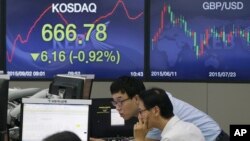Major stock markets in China and elsewhere in the region saw another day of volatile trading Wednesday, as the head of the IMF warned that concerns over Asia's economy are reverberating across the globe.
Shanghai stocks plunged nearly 4.5 percent at opening, before recovering to finish down two-tenths of one percent.
In Tokyo, the Nikkei also tumbled in morning trading, but ended the day down only four-tenths of one percent. Trading was basically flat in Seoul and Sydney.
The turbulent trading in Asia followed a poor day on Wall Street, where main indexes lost about 3 percent on Tuesday, as fears grew about a slowdown in the world economy.
IMF head Christine Lagarde, who is visiting Indonesia, on Wednesday said the recent market volatility shows how rapidly concerns can spread from one region to the next.
"What has been demonstrated in the last few weeks is how much Asia is at the core of global economy, and how much disruptions occurring in one market in Asia can actually spill over to the rest of the world," Lagarde said.
Lagarde said Asian economies were doing "pretty well" despite the turmoil, but warned that more volatile can be expected. "Now the situation is changing yet again, and we are feeling the impact of China's rebalancing and moving to a revised business model," she added.
China last month unexpectedly allowed the value of its currency to weaken. Beijing said the move was aimed at making the yuan more market-oriented, but there were concerns it demonstrates the extent to which Chinese leaders are concerned about slowing growth in the world's second-largest economy.
China, which has been the driver of global economic growth, is in the midst of transitioning from a manufacturing, investment, and export led growth model to one built more on domestic consumption.
During the transition, Chinese leaders have signaled they are willing to put up with slower economic growth than the breakneck, double-digit expansion seen for much of the past three decades. Beijing has said it expects the economy to grow at about 7 percent this year, though there are concerns whether it will meet that mark.
Investors are also concerned that officials in the world's other large economy, the United States, are preparing to raise interest rates, possibly this year or in 2016.
Some analysts say Friday's U.S. jobs report could play a role in helping the U.S. Federal Reserve decide whether the economy is healthy enough to raise the interest rates, a move that helps fight inflation.











